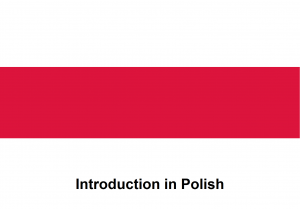Difference between revisions of "Language/Polish/Vocabulary/Introduction"
(Introduction in Polish) |
m (Quick edit) |
||
| (One intermediate revision by the same user not shown) | |||
| Line 1: | Line 1: | ||
[[File:Introduction in Polish.png|alt=Introduction in Polish|thumb|'''Introduction in Polish''']] | [[File:Introduction in Polish.png|alt=Introduction in Polish|thumb|'''Introduction in Polish''']] | ||
Hello Everyone, 😊 | Hello Everyone, 😊 | ||
| Line 8: | Line 7: | ||
Please feel free to edit this page if you think it can be improved! | Please feel free to edit this page if you think it can be improved! | ||
Happy learning! | |||
After you've developed a deeper understanding of this content, you might be keen on these associated topics: [[Language/Polish/Vocabulary/Clothes|Clothes]], [[Language/Polish/Vocabulary/Astronomy|Astronomy]], [[Language/Polish/Vocabulary/Fishes|Fishes]] & [[Language/Polish/Vocabulary/Numbers|Numbers]]. | |||
== '''Introduction in Polish''' == | == '''Introduction in Polish''' == | ||
=== '''First things first''' === | === '''First things first''' === | ||
| Line 85: | Line 82: | ||
* Due to massive influence of English language a lot of words are simplified and "Polish-ized"... for example we often say '''"Sory"''' instead of '''"Przepraszam".''' | * Due to massive influence of English language a lot of words are simplified and "Polish-ized"... for example we often say '''"Sory"''' instead of '''"Przepraszam".''' | ||
* Polish language is one of few (or maybe the only one) in which '''"No"''' means '''"Yes"'''... '''''with Polish pronounciation''''' '''"No"''' is a sign of approval. | * Polish language is one of few (or maybe the only one) in which '''"No"''' means '''"Yes"'''... '''''with Polish pronounciation''''' '''"No"''' is a sign of approval. | ||
==Other Lessons== | |||
* [[Language/Polish/Vocabulary/Drinks|Drinks]] | |||
* [[Language/Polish/Vocabulary/Essencial-Phrases-in-Polish|Essencial Phrases in Polish]] | |||
* [[Language/Polish/Vocabulary/Zoo|Zoo]] | |||
* [[Language/Polish/Vocabulary/Health|Health]] | |||
* [[Language/Polish/Vocabulary/Biology|Biology]] | |||
* [[Language/Polish/Vocabulary/Sports|Sports]] | |||
* [[Language/Polish/Vocabulary/Animal|Animal]] | |||
* [[Language/Polish/Vocabulary/At-Home|At Home]] | |||
* [[Language/Polish/Vocabulary/Count-from-0-to-10|Count from 0 to 10]] | |||
* [[Language/Polish/Vocabulary/Verbs-in-Polish|Verbs in Polish]] | |||
<span links></span> | |||
Latest revision as of 20:20, 26 March 2023
Hello Everyone, 😊
In today’s lesson we are going to study the following topic: ”INTRODUCTION” in Polish
Please feel free to edit this page if you think it can be improved!
Happy learning!
After you've developed a deeper understanding of this content, you might be keen on these associated topics: Clothes, Astronomy, Fishes & Numbers.
Introduction in Polish[edit | edit source]
First things first[edit | edit source]
So, usually the first thing you need to learn during learning a new language is how to introduce yourself. Here are some of the useful phrases:
- Mam na imię... (name) - My name is... (name)
- Mam (number) lat. - I'm (number) years old.
- Pochodzę z... (place) - I'm come from... (place)
- Pracuję jako... (profession) - I work as... (profession)
- Interesuję się... - I'm interested with...
- W wolnym czasie... - In my free time...
Greetings[edit | edit source]
But to introduce yourself, you need to know how to greet a person you'll be talking with. For example:
- Hej! - Hey!
- Cześć! - Hello!
- Dzień dobry! - Good morning/afternoon!
- Dobry wieczór! - Good evening!
Basic words and phrases[edit | edit source]
Some other basic words that you should know contain:
- Proszę! - Please (when we're asking for something)
- Proszę! - Here you are! (when we're handing something to another person)
- Dzięki!/Dziękuję! - Thanks!/Thank you!
- Przepraszam. - Sorry (when we want to apologize)
- Przepraszam! - Excuse me! (for example: when we're going through the crowd)
- Tak - Yes
- Nie - No
- Rozumiem. - I understand.
- Nie rozumiem - I don't understand
Questions[edit | edit source]
In a basic conversation you should also ask some questions to another person... such as:
- Jak masz na imię? - What's your name?
- Ile masz lat? - How old are you?
- Gdzie mieszkasz? - Where do you live?
- Skąd jesteś? - Where are you from?
- Co robisz? - What are you doing?
- Jak tam?/Jak się masz? - What's up?/How are you?
- Mówisz po angielsku? - Do you speak English?
Goodbyes[edit | edit source]
After a conversation it's proper to say "Goodbye", right? Here are some ways to say it:
- Hej!/ Cześć! - Bye! (yes... it's the same as in the "Greetings" section)
- Pa! - Bye!
- Do widzenia - Goodbye
- Dobranoc! - Good night!
- Do zobaczenia - See you soon
- Żegnaj! - Farewell! (but it's too dramatic ^^)
- Nara! - See ya! (slang)
Exercises[edit | edit source]
To practise introductions even more, here you have some exercises! Enjoy! ^^
Translate to English
- Mam na imię Kasia.
- Mam 19 lat.
- Pracuję jako doktor.
- Interesuję się muzyką i sztuką.
- W wolnym czasie słucham jazzu i gotuję.
Translate to Polish
- My name is Frederica and I'm 23 years old.
- I'm working as a vet.
- Yes, I'm from Sweden!
- No, I don't speak Norwegian.
- Hey, Naomi! What's up?
Trivia[edit | edit source]
- The literal translation of "Mam (number) lat" is "I have (number) years"... for example "Mam 36 lat" is "I have 36 years"
- Due to massive influence of English language a lot of words are simplified and "Polish-ized"... for example we often say "Sory" instead of "Przepraszam".
- Polish language is one of few (or maybe the only one) in which "No" means "Yes"... with Polish pronounciation "No" is a sign of approval.
Other Lessons[edit | edit source]
- Drinks
- Essencial Phrases in Polish
- Zoo
- Health
- Biology
- Sports
- Animal
- At Home
- Count from 0 to 10
- Verbs in Polish
